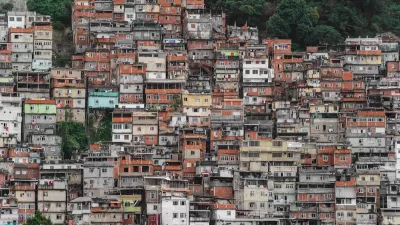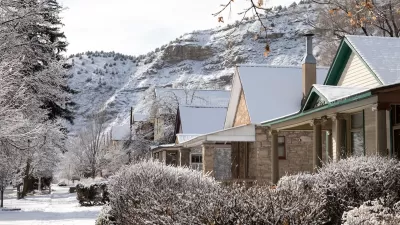In an address heavy on President Obama's domestic agenda for the first year of his second term, issues of importance to planners and urbanists got plenty of play, including: the environment, energy, infrastructure, and the economy.
If you want to get buried in the backgrounds, explanations, and policy implications of the many elements of last night's State of the Union address, there's no better destination than The Washington Post Wonkbook blog's recap. For this post, however, we'll focus on four items of importance to planners and urbanists:
Environment
Following up on promising indications from his Inaugural address, after complaints over its absence from the Presidential campaign, President Obama made explicit his intention to focus on climate change during his second term. After pointing to the clear link between climate change and extreme weather, Obama promised action on climate change (with or without the aid of Congress), reports Juliet Eilperin:
"While President Obama called on Congress to pass the same kind of cap-and-trade legislation which died in 2010, urging it 'to pursue a bipartisan, market-based solution to climate change,' no such bill is likely to pass in the next two years. The president acknowledged this in his speech, saying, 'But if Congress won’t act soon to protect future generations, I will.'
Energy
On Energy, the President focused on increasing the efficiency of homes and businesses through the establishment an “Energy Efficiency Race to the Top” program "to encourage states to cut waste, through measures such as adopting tighter building efficiency standards and making it easier for industrial facilities to combine their heat and power generation."
He also proposed increasing funding for alternative energy research and development by using revenues from oil and gas production; "a plan that will almost certainly draw criticism from Republicans."
Infrastructure
Since his first days in office, the President has acknowledged the need to repair and modernize the country's aging infrastructure and has seen those projects as a vehicle to boost the economy. Thus, it wasn't surprising to hear the President promote such spending, including a "Fix-it-First" strategy in last night's address. The folks at Transportation for America cheered the President's remarks, but are anxious to hear more about the proposal. "It did our hearts good to hear the President talk about creating a Fix-it-First program (where have we heard that before?) that will focus on the health of our infrastructure, such as the 70,000 structurally deficient bridges," says David Goldberg. "As we’ve noted, there are more such bridges scattered around the country than there are McDonald’s, nearly one in ten bridges."
"Transit systems, too, are suffering from decay after a long recession that saw budgets cut to the bone and beyond. Our ports and freight networks need help, too. So, again, we were very pleased to hear the announcement of a focus on the upkeep of our key transportation networks – helping to ensure repair of existing infrastructure remains a priority."
Economy
Improving the economy and the plight of the country's struggling middle class was a centerpiece of the President's speech. According to the President, a central element of that strategy is the expansion of new jobs and manufacturing. On this point, Richard Florida disagrees with the President's focus: "While there is much to applaud about the recent revival of American industry, manufacturing is simply insufficient to help revive lagging industrial regions or power the job creation the nation so badly needs."
For a description of the other elements from the speech that could have a significant impact on cities (such as raising the federal minimum wage and gun violence), see Harry Moroz's post in Next City.
FULL STORY: Wonkbook: All about the policies of the State of the Union

Maui's Vacation Rental Debate Turns Ugly
Verbal attacks, misinformation campaigns and fistfights plague a high-stakes debate to convert thousands of vacation rentals into long-term housing.

Planetizen Federal Action Tracker
A weekly monitor of how Trump’s orders and actions are impacting planners and planning in America.

Chicago’s Ghost Rails
Just beneath the surface of the modern city lie the remnants of its expansive early 20th-century streetcar system.

Bend, Oregon Zoning Reforms Prioritize Small-Scale Housing
The city altered its zoning code to allow multi-family housing and eliminated parking mandates citywide.

Amtrak Cutting Jobs, Funding to High-Speed Rail
The agency plans to cut 10 percent of its workforce and has confirmed it will not fund new high-speed rail projects.

LA Denies Basic Services to Unhoused Residents
The city has repeatedly failed to respond to requests for trash pickup at encampment sites, and eliminated a program that provided mobile showers and toilets.
Urban Design for Planners 1: Software Tools
This six-course series explores essential urban design concepts using open source software and equips planners with the tools they need to participate fully in the urban design process.
Planning for Universal Design
Learn the tools for implementing Universal Design in planning regulations.
planning NEXT
Appalachian Highlands Housing Partners
Mpact (founded as Rail~Volution)
City of Camden Redevelopment Agency
City of Astoria
City of Portland
City of Laramie




























